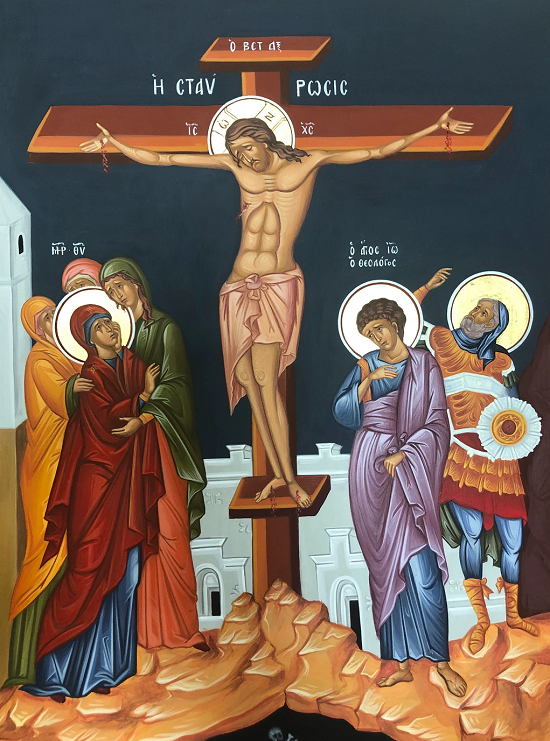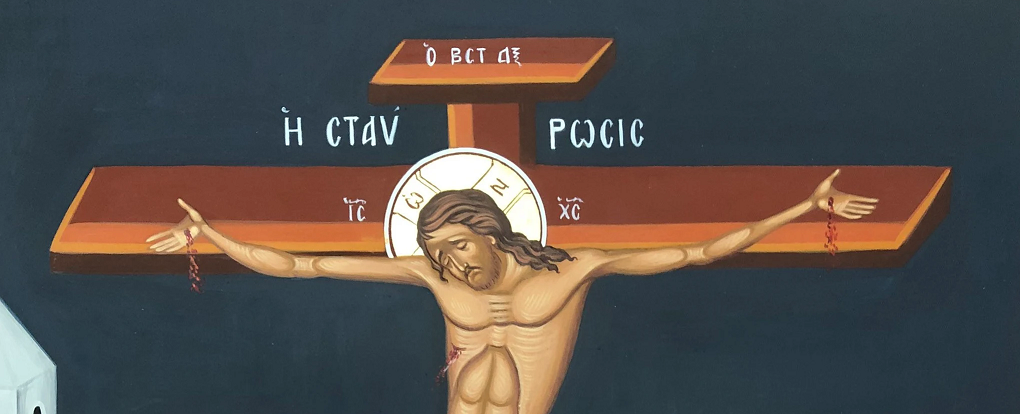Power, The Great Delusion
Good Friday Scripture Readings

I can’t imagine any other historical event that has received as much thought and scrutiny in the Western world, at least, as Jesus’s crucifixion. I hardly expect to add anything uniquely new to our consideration this afternoon. Jesus’s passion and death serve in large part to redefine our understanding of life and what it means to be human. It begins with what it means to be in charge. Even our most basic instinct—and that of all conscious beings—is survival, and the law of the jungle means survival of the fittest. It’s the most human of desires to strive for power. Even the three great motivators, namely wealth, power, and prestige, all translate into power. Isn’t that what wealth buys? Isn’t that the end result of public acclaim? Yes, power is the name of the human game, and all our games, from cards to war, have a single goal: dominance.
It’s no secret that Judah and Israel were never world powers. From their earliest history, they were overshadowed by greater civilizations like Egypt, Assyria, Babylonia, Persia, Greece, and Rome. Each of them in their own right, threatened Israel’s very existence. They never got to be the alpha dog, and always dreamed that someday it would be their turn to dominate. Their inability to succeed wasn’t from lack of trying. Their kings, from Saul and David down to Zedekiah who was exiled to Babylon, Israel and Judah fought wars to overcome their enemy neighbors. Even in defeat, for hundreds of years, the flame of hope was kept alive: someday, with God’s help, Israel would win out. They looked for another anointed king—a Messiah—who would win for them the power and dominance they craved. After all, hadn’t God promised it?
That expectation of a Messiah king from David’s family explains why it was so important to the Israelites, and the evangelists in particular, that Joseph, the father of Jesus, was “of the house and lineage of David,” even though David had died almost a thousand years earlier and, by that time, there’s no telling how diluted that blood line had become. Yet it was critical to those who followed Jesus that he was of the royal blood line—at least nominally. There’s no question that Jesus exuded power. His preaching was like one with authority. He performed mighty deeds, and even demons obeyed his commands. His very presence attracted attention and, wherever he went, he drew crowds. He confronted the religious authorities of his day and regularly bested them at their own game. He didn’t need an army to exert his power. People naturally gravitated to him. And everyone who encountered him, from fishermen to John the Baptist asked, “Are you the one who is to come? Are you the Messiah, the anointed king?”
Everything about Jesus’s passion and death revolved around that question. The religious authorities, in particular, were quaking in their boots because they saw beyond a shadow of a doubt that, if Jesus but gave the nod, the people would rise up behind him and acknowledge him as their king. If that were to happen, the boot of Rome would come down on them hard, and they themselves would lose what mattered most to them: their prestige, their wealth, and, most importantly, their power. They therefore struck at Jesus before he could give that signal—a signal that obviously would never have come. So, ironically, they accused him in-house among their own of being the Son of God who was to come, someone they saw as a quasi-divine figure, but outside, before Rome, they accused him of sedition, plotting to revolt against Roman authority and to make himself king.
Before Pilate, the Procurator, those arguments fell flat as soon as he encountered Jesus in person. He could see that Jesus wasn’t interested in power. There wasn’t an ounce of political ambition in him. Yet, throughout the drama playing out in Jerusalem that day, the question of kingship and power held center stage. The religious authorities weren’t novices at playing power games. Their threats to complain to Rome about Pilate being soft on sedition hit their mark. It was the sort of scene Pilate wanted no part in. He also knew his adversaries and he knew that throwing them a bone now would hold off bigger problems later. After all, he had come to Jerusalem from Caesarea particularly because he expected trouble at Passover time, and he couldn’t afford to appear weak. Jesus was that bone. Pilate won the prestige game, after all, though, mocking the religious authorities by posting the charges against Jesus there on the cross for all to see: The King of the Jews. Power play followed after power play and, in the end, it all came to nothing.
The most powerful one that day was the one who refused to exercise it. Jesus reigned supreme every step of the way, from his arrest in the garden of Gethsemane to the very end. He didn’t try to out-maneuver anyone, but by refusing to play the power game, he was in control throughout until his last breath. If you understand crucifixion, you’ll know it was death by asphyxiation. Hanging by the nails in the wrists caused the chest muscles to cramp. That was only relieved by pushing up on the nail through the feet. Eventually, sometimes after days of this, the condemned would be exhausted—or have his legs broken so that he could no longer stand—and the cramping would come so that he could no longer exhale. Jesus, as a final exercise of his ultimate authority and power, chose to stop fighting it and allowed the end to come.
The passion and death of Christ is a constant reminder of how wrong we humans can be. We still expend all kinds of time and energy in the pursuit of wealth, power, and prestige to show our dominance over others, over life itself, and over the fears and insecurities that haunt us. Yet that’s not the answer. It never was the answer and never will be. Jesus overcame the machinations of the religious authorities and the power of Rome by refusing to play that game. His refusal destroyed not only their power, but death itself as he revealed the resurrection. Like Jesus who showed us the way, the real answer lies in acceptance, surrender, and gratitude: acceptance of the world on the world’s terms and not as we’d like it to be, surrender of the temptation to fight anybody or anything, and gratitude in recognition that all we have—the bad as well as the good—and all we are is a gift from a loving God who, if we simply trust him, will always raise us up.
When we look at the crucifix, that image of the power of God laughing in the face of human power games, let’s not take this image for granted. We’re looking at the death, not of the Messiah who lives and reigns forever, but the death of the illusion of wealth, power, and prestige. Let it be a reminder of the death of the survival of the fittest and the resurrection of those who, following Jesus, put their trust in God with all their hearts, and souls, and minds, and strength…and who, in gratitude, love their neighbors as themselves.
Get articles from H. Les Brown delivered to your email inbox
